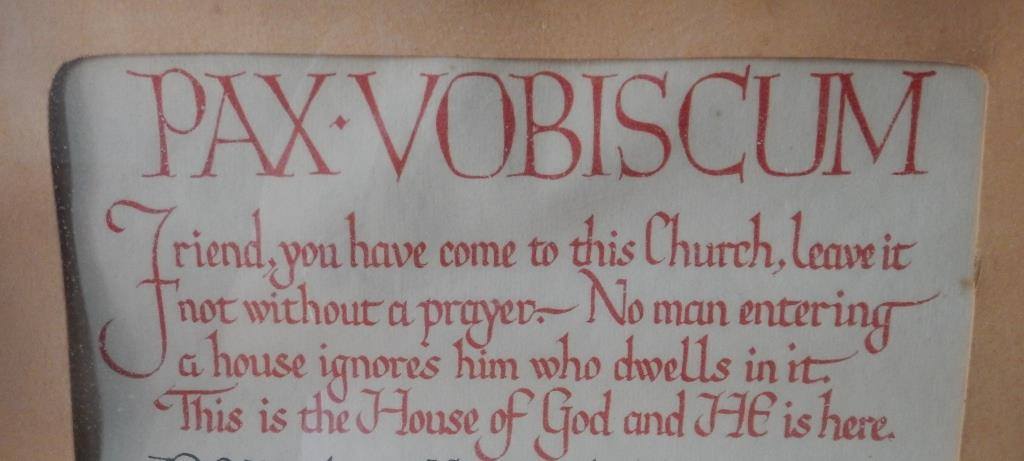WHAT WE BELIEVE
There is one body, and one Spirit, even as ye are called in one hope of your calling; one Lord, one faith, one baptism, one God and Father of all, who is above all, and through all, and in you all. Ephesians 4:4-6
THE APOSTLE’S CREED
We believe in God the Father Almighty,
Maker of heaven and earth:
And in Jesus Christ his only Son our Lord,
Who was conceived by the Holy Ghost,
Born of the Virgin Mary,
Suffered under Pontius Pilate,
Was crucified, dead, and buried:
He descended into hell;
The third day he rose again from the dead;
He ascended into heaven,
And sitteth on the right hand of God the Father Almighty;
From thence he shall come to judge the quick and the dead.
We believe in the Holy Ghost;
The holy Catholic Church;
The Communion of Saints;
The Forgiveness of sins;
The Resurrection of the body,
And the Life everlasting.
Amen
Anglicans have a few confessional documents that define who we are and what we believe. Our foundations are the Bible, the historic Creeds (especially the Apostles' Creed above, and the Nicene Creed), the Book of Common Prayer, the Hymnal, the writings of the early Ecumenical Councils, and the writings of influential early Christian thinkers, and the institutional hierarchy of laity, deacon, priest, and bishop. Together, these comprise our "Eden": a fertile, walled, protected garden within whose limits our faith and life together, as individuals and as a church, grows in great profusion and variety.
Our stream of the Christian tradition comes down to us from the early Church through the Medieval Roman Church. Historic developments and the influence of the Reformation gave rise to a distinctive kind of Christianity that combines features of the universal church with cultural influences from early Celtic Christians, Eastern Christians, and the spirituality of monks of the Order of Saint Benedict. This combination is often called "Anglican."
As the British Empire spread, this stream of the Christian tradition went with it, and took root in its colonies. When those colonies achieved independence, the church in each colony acquired its own distinctiveness, without losing its genealogical ties to the Church of England. These churches became known as the "Anglican Communion." In the late 20th and early 21st century, some of those churches (called "provinces") have begun to break those cultural and even theological bonds.
The Episcopal Church is the branch of the Anglican Communion in the United States that was constituted as an independent church following Independence from Great Britain. It now has its own missions abroad. The Episcopal Church ("TEC") is composed of dioceses, each of which is governed and pastored by a Bishop.
Saint Paul's is a missionary outpost (all parishes are missionary outposts!) of the Diocese of Albany. The see of Albany is currently vacant. The Standing Committee, elected by the clergy and people of the Diocese gathered in an annual Diocesan Convention, currently serves as the Ecclesiastical Authority of the Diocese.
As a Diocese we are, and remain, One Church of Disciples Making Disciples.
We believe in God the Father Almighty,
Maker of heaven and earth:
And in Jesus Christ his only Son our Lord,
Who was conceived by the Holy Ghost,
Born of the Virgin Mary,
Suffered under Pontius Pilate,
Was crucified, dead, and buried:
He descended into hell;
The third day he rose again from the dead;
He ascended into heaven,
And sitteth on the right hand of God the Father Almighty;
From thence he shall come to judge the quick and the dead.
We believe in the Holy Ghost;
The holy Catholic Church;
The Communion of Saints;
The Forgiveness of sins;
The Resurrection of the body,
And the Life everlasting.
Amen
Anglicans have a few confessional documents that define who we are and what we believe. Our foundations are the Bible, the historic Creeds (especially the Apostles' Creed above, and the Nicene Creed), the Book of Common Prayer, the Hymnal, the writings of the early Ecumenical Councils, and the writings of influential early Christian thinkers, and the institutional hierarchy of laity, deacon, priest, and bishop. Together, these comprise our "Eden": a fertile, walled, protected garden within whose limits our faith and life together, as individuals and as a church, grows in great profusion and variety.
Our stream of the Christian tradition comes down to us from the early Church through the Medieval Roman Church. Historic developments and the influence of the Reformation gave rise to a distinctive kind of Christianity that combines features of the universal church with cultural influences from early Celtic Christians, Eastern Christians, and the spirituality of monks of the Order of Saint Benedict. This combination is often called "Anglican."
As the British Empire spread, this stream of the Christian tradition went with it, and took root in its colonies. When those colonies achieved independence, the church in each colony acquired its own distinctiveness, without losing its genealogical ties to the Church of England. These churches became known as the "Anglican Communion." In the late 20th and early 21st century, some of those churches (called "provinces") have begun to break those cultural and even theological bonds.
The Episcopal Church is the branch of the Anglican Communion in the United States that was constituted as an independent church following Independence from Great Britain. It now has its own missions abroad. The Episcopal Church ("TEC") is composed of dioceses, each of which is governed and pastored by a Bishop.
Saint Paul's is a missionary outpost (all parishes are missionary outposts!) of the Diocese of Albany. The see of Albany is currently vacant. The Standing Committee, elected by the clergy and people of the Diocese gathered in an annual Diocesan Convention, currently serves as the Ecclesiastical Authority of the Diocese.
As a Diocese we are, and remain, One Church of Disciples Making Disciples.
